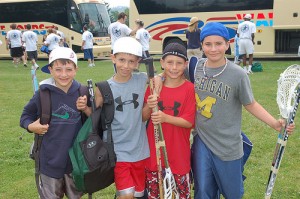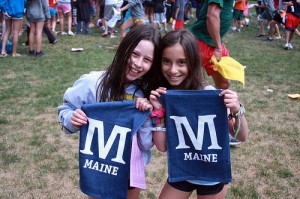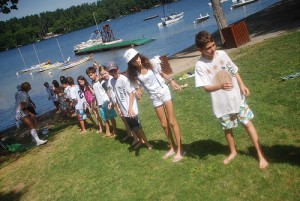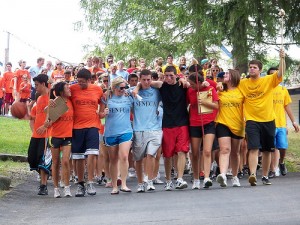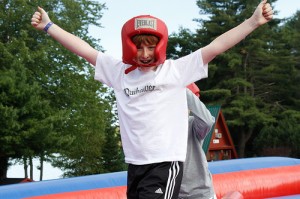As part of iconic America, many American summer camps are steeped in rich histories. America’s Finest Summer Camps are no exception. We thought we would take a minute to share a brief history of each camp with you.
Camp Laurel
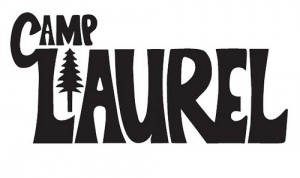 Camp Laurel was founded in 1949 and has been in continuous operation ever since. Its original site was on Lake Awosting, New York. During this period, the camp was under the co‑direction of Mel and Bette Archard and John and Alice Harrison. In the fall of 1965 the camp moved to its present site on Echo Lake in Mt. Vernon, Maine. Camp Laurel opened at its new site on July 1, 1966. In 1974 Ron Scott began working for Camp Laurel on a full‑time basis, and in 1978 Ron and Ann joined Mel and Bette as Directors. In 1979 Ron and Ann purchased Camp Laurel and assumed the roles of Owners and Directors. In 1994, after spending three summers as Co-Director, Keith Klein purchased Camp Laurel and has served as Owner and Director since that time. Jem Sollinger, a long-time camper and counselor, joined Keith as Co-Director in 2002. In 2007, Jem and his wife, Debbie, assumed the directorship of Laurel. Keith maintains an active role as Director and spends his summers on Echo Lake, Maine along with Jem and Debbie.
Camp Laurel was founded in 1949 and has been in continuous operation ever since. Its original site was on Lake Awosting, New York. During this period, the camp was under the co‑direction of Mel and Bette Archard and John and Alice Harrison. In the fall of 1965 the camp moved to its present site on Echo Lake in Mt. Vernon, Maine. Camp Laurel opened at its new site on July 1, 1966. In 1974 Ron Scott began working for Camp Laurel on a full‑time basis, and in 1978 Ron and Ann joined Mel and Bette as Directors. In 1979 Ron and Ann purchased Camp Laurel and assumed the roles of Owners and Directors. In 1994, after spending three summers as Co-Director, Keith Klein purchased Camp Laurel and has served as Owner and Director since that time. Jem Sollinger, a long-time camper and counselor, joined Keith as Co-Director in 2002. In 2007, Jem and his wife, Debbie, assumed the directorship of Laurel. Keith maintains an active role as Director and spends his summers on Echo Lake, Maine along with Jem and Debbie.
Camp Starlight
Founded in 1947 by the Schmierer family, 2011 marks Camp Starlight’s 65th year of making tradition, spirit, friendship, adventure,  family, and fun. These are the words used by campers, parents, and staff to define their experiences and memories of Camp Starlight. Located in Starlight, Pennsylvania, just two and a half hours northwest of New York City, a drive up the mile long road brings you to the 285 acre brother/sister campus with its own private lakes and surrounded by the “endless mountains” of Pennsylvania.
family, and fun. These are the words used by campers, parents, and staff to define their experiences and memories of Camp Starlight. Located in Starlight, Pennsylvania, just two and a half hours northwest of New York City, a drive up the mile long road brings you to the 285 acre brother/sister campus with its own private lakes and surrounded by the “endless mountains” of Pennsylvania.
A glimpse at the endless rows of bunk plaques inside the Dining Room will provide any visitor with an instant glimpse of what a special place Camp Starlight has been to campers and staff alike in its 65 years of existence. David and Allison Miller purchased Camp Starlight in 1999 and are now in their 13th year of serving as its Owners/Directors.
Camp Laurel South
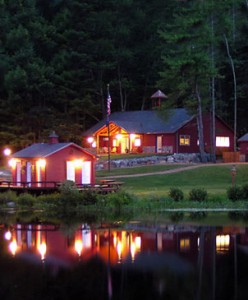 Laurel camping was founded in 1949 and Camp Laurel operated its first summer in 1950 under the direction of the Archard and Harrison families. In 1974, Ron and Ann Scott joined Ann’s parents, Mel and Bette Archard, as Directors. In 1979 Ron and Ann purchased Laurel and assumed the roles of Owners and Directors. In 1994, Keith Klein purchased Camp Laurel from the Scotts. Keith owns Laurel today along with his partners, Jem and Debbie Sollinger. The Scotts purchased the former Dr. Johnson’s Camps in 1992 at its site on Crescent Lake in Casco, Maine, and renamed it Laurel South. Laurel South operated its first summer in 1993 under the leadership of Roger and Dagni Christian. In the fall 0f 1998, Roger and Dagni, along with Keith, took ownership of Laurel South and continue their partnership to this day.
Laurel camping was founded in 1949 and Camp Laurel operated its first summer in 1950 under the direction of the Archard and Harrison families. In 1974, Ron and Ann Scott joined Ann’s parents, Mel and Bette Archard, as Directors. In 1979 Ron and Ann purchased Laurel and assumed the roles of Owners and Directors. In 1994, Keith Klein purchased Camp Laurel from the Scotts. Keith owns Laurel today along with his partners, Jem and Debbie Sollinger. The Scotts purchased the former Dr. Johnson’s Camps in 1992 at its site on Crescent Lake in Casco, Maine, and renamed it Laurel South. Laurel South operated its first summer in 1993 under the leadership of Roger and Dagni Christian. In the fall 0f 1998, Roger and Dagni, along with Keith, took ownership of Laurel South and continue their partnership to this day.
While Laurel South is known as a first-rate facility, Roger, Dagni and Keith have always maintained that it is the people who make Laurel South the special place it is today. Every camper and counselor has left an impression on our camp and contributed to the rich tradition we enjoy. As we speak with Laurel South alumni, we often hear stories of Spirit Days, Council Fires, Carnival, S- Day’s, Ohana, Socials…the list goes on and on. The overriding theme that ties each of these stories together is memories. Memories of friendships and fun which last long after the summers spent at camp.
Camp Weequahic
Weequahic was founded in 1953 by Art and Mollie Lustig and operated under the directorship of the same family for more than five 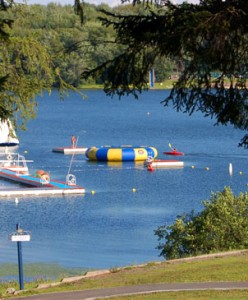 decades. The ideal with which camp was started – to provide the best in camping –still holds true today, almost 60 years after our first campers spent their summer with us in Lakewood, Pennsylvania.
decades. The ideal with which camp was started – to provide the best in camping –still holds true today, almost 60 years after our first campers spent their summer with us in Lakewood, Pennsylvania.
Weequahic is far more than the facilities and scenic beauty of over 100 acres located in Wayne County, although these are certainly part of what has made Weequahic so special. It’s the people and their relationships that make Weequahic what it is. Our campers learn new activities every year, but what draws them back is our warm, caring environment… an environment in which friendships are encouraged and where self-sufficiency and tolerance in learning to live with others is taught.
The current Directors, Cole and Kate Kelly, work tirelessly to insure that the Weequahic motto, which has been maintained for almost 60 years, continues to be:
“Where Caring is a Tradition.”
So there you have it. If you’ve been doing your math, then by now you’ve figured out that, combined, we have 200 years of experience in the camping! For America’s Finest Summer Camps, history is our past, present, and future.
 Something you might not know about summer camp: It breeds passionate athletes in many different sports, even ones that are little known outside of summer camp, such as ga-ga. Although it’s not well known in America (but becoming more so everyday!), hoards of campers dream all winter about getting back into the ga-ga pit. Many camps even have ga-ga tournaments! Camp challenge weeks even have ga-ga challenges. There is no doubt that campers are going gaga for ga-ga!
Something you might not know about summer camp: It breeds passionate athletes in many different sports, even ones that are little known outside of summer camp, such as ga-ga. Although it’s not well known in America (but becoming more so everyday!), hoards of campers dream all winter about getting back into the ga-ga pit. Many camps even have ga-ga tournaments! Camp challenge weeks even have ga-ga challenges. There is no doubt that campers are going gaga for ga-ga!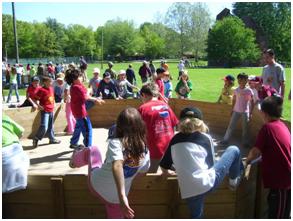 played virtually anywhere there are four walls or barriers. As in dodgeball, when players are hit with the ball, they are out. They may, however, use the walls of the ga-ga court to clear the ball. As players are struck by the ball, they are eliminated, and leave the pit. The last boy (or girl) standing wins. Two primary ways that ga-ga differs from dodgeball is that ga-ga strikes must be at or below the knees and players bounce rather than throw the ball. Also unlike dodgeball, players may either bounce the ball at other players or against the walls of the pit. Some camps have adopted rules of play unique to their campers’ style of ga-ga play, while others prefer to stick to the official rules…What? There are official rules? Yep. In fact, there is even an International Championship Tournament held annually in Europe. More than 30 countries , including the U.S., winner of multiple championship titles, participate.
played virtually anywhere there are four walls or barriers. As in dodgeball, when players are hit with the ball, they are out. They may, however, use the walls of the ga-ga court to clear the ball. As players are struck by the ball, they are eliminated, and leave the pit. The last boy (or girl) standing wins. Two primary ways that ga-ga differs from dodgeball is that ga-ga strikes must be at or below the knees and players bounce rather than throw the ball. Also unlike dodgeball, players may either bounce the ball at other players or against the walls of the pit. Some camps have adopted rules of play unique to their campers’ style of ga-ga play, while others prefer to stick to the official rules…What? There are official rules? Yep. In fact, there is even an International Championship Tournament held annually in Europe. More than 30 countries , including the U.S., winner of multiple championship titles, participate.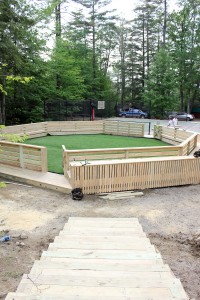 No one quite knows how ga-ga originated or where it comes from, but rumor has it that the game gets its name from the sound the ball makes during the opening play. It’s bounced twice in the air and the players say “ga” on each bounce. On the third bounce, the ball is in play (some rules call for three bounces with the ball officially in play on the fourth bounce). So warm up your ga-ga hands and start stretching. We’ll see you in the pit!
No one quite knows how ga-ga originated or where it comes from, but rumor has it that the game gets its name from the sound the ball makes during the opening play. It’s bounced twice in the air and the players say “ga” on each bounce. On the third bounce, the ball is in play (some rules call for three bounces with the ball officially in play on the fourth bounce). So warm up your ga-ga hands and start stretching. We’ll see you in the pit!
 570-798-9831
570-798-9831





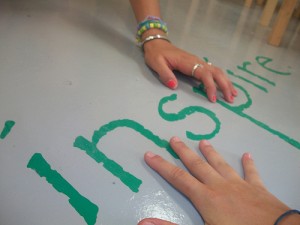
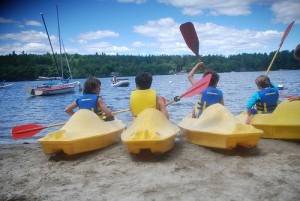


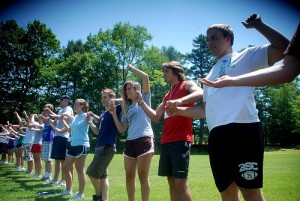
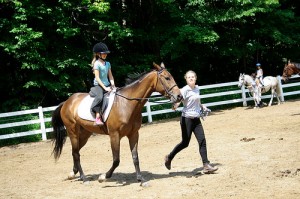
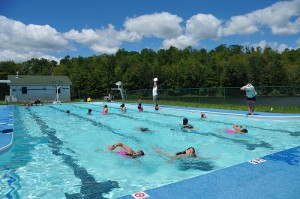
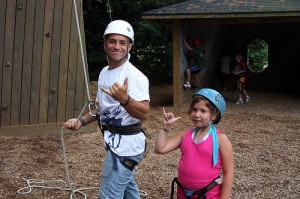
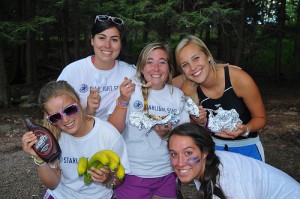
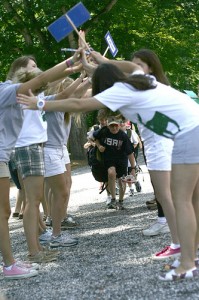
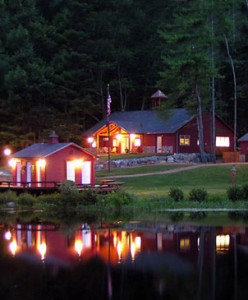
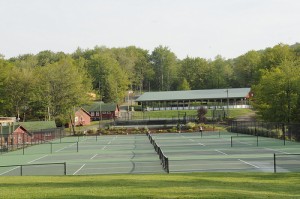
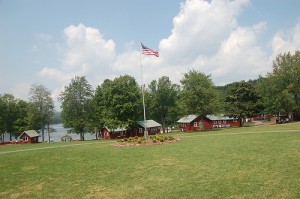
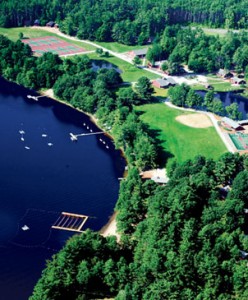
 6. Make your Visiting Day plans and book lodging. Yes, it’s true that your children haven’t even left for camp yet. But many hotels within the immediate vicinity of a camp often book months in advance. If you’re unsure of the lodging options near your children’s camp, contact the camp office.
6. Make your Visiting Day plans and book lodging. Yes, it’s true that your children haven’t even left for camp yet. But many hotels within the immediate vicinity of a camp often book months in advance. If you’re unsure of the lodging options near your children’s camp, contact the camp office. 4. Ensure you have all adequate sports and musical equipment in order: the wheels on the roller blades are oiled, the shin pads are the proper fit, and the guitar strings have been tightened. Just as if they are going off to rehearsal, your children’s sports equipment will receive as much of a workout at camp as it will at home. Sending your campers with properly maintained and fitting equipment can have a tremendous affect on the success of their summer.
4. Ensure you have all adequate sports and musical equipment in order: the wheels on the roller blades are oiled, the shin pads are the proper fit, and the guitar strings have been tightened. Just as if they are going off to rehearsal, your children’s sports equipment will receive as much of a workout at camp as it will at home. Sending your campers with properly maintained and fitting equipment can have a tremendous affect on the success of their summer. 3. Pack. It sounds so simple. Yet, for camp, it’s quite the production. Most camps strongly advise against packing any clothing that can’t withstand commercial laundry services. It’s also wise to remember that camps often downplay the importance of physical appearance, which means leaving the “dry clean only” and “one of kind” items at home is typically a good idea. Once you have your children’s bags packed, don’t forget to arrange for them to be delivered to camp by the designated date.
3. Pack. It sounds so simple. Yet, for camp, it’s quite the production. Most camps strongly advise against packing any clothing that can’t withstand commercial laundry services. It’s also wise to remember that camps often downplay the importance of physical appearance, which means leaving the “dry clean only” and “one of kind” items at home is typically a good idea. Once you have your children’s bags packed, don’t forget to arrange for them to be delivered to camp by the designated date.